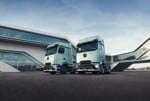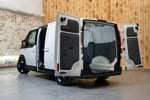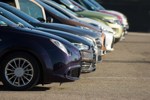Analysis of cars and vans operated by FleetCheck customers shows the ‘disparity’ in fleet operators’ emissions.
It found one in 20 (5.3%) of company cars and vans being operated by its customer base of only meet the Euro 4 emissions standard or older.
A further 18.2% of vehicles from the total sample of 85,792 also fall behind the latest Euro 6 legislation by only achieving Euro 5, figures released by the fleet software specialist show.
Peter Golding, managing director at FleetCheck, said: “We compiled these figures to illustrate the disparity that currently exists across fleets when it comes to emissions.
“While at one extreme, some are actively working to achieve zero emissions, at the other, we can see that almost a quarter of all the vehicles our customers operate are Euro 5 or older.”
Golding says, because there is a strong SME bias in its customer base, and these businesses tend to hang on to cars and vans for longer than corporates, they are probably worse than the fleet parc as a whole.
“They remain an indication of how far the industry will have to travel to achieve the kind of low or zero emissions performance we’d all like to see,” he said.
He added that most of the oldest and most polluting vehicles in the analysis appeared to be diesel vans, many of which were operated on a spare or pool vehicle basis.
“It is not uncommon for smaller businesses to continue to operate vans until they become uneconomic to repair or too unreliable for everyday use,” he said.
“Even some of the latter will be kept in the yard as a spare van and used occasionally. However, there is a strong argument that these vehicles shouldn’t be on the road at all, given their poor emissions.”
Over the next few years, he added, there was a strong possibility that the introduction of clean air zones (CAZs) would start to see more of these vehicles disappear from fleets.
He explained: “While CAZs have arguably got off to a slow start, it seems likely that at least some will ultimately move to the ULEZ model and operate a Euro 6 minimum for diesel vehicles. This is one of the factors that will start to see some of these older vans start to disappear.
“However, well ahead of that point, more could be done to persuade fleets to stop operating these vehicles. That might mean disincentives using measures such as Vehicle Excise Duty or it could mean incentives such as wider use of scrappage schemes.
“On a simpler level, the economics behind the ongoing operation of these older vans are often highly questionable and getting this message across to businesses is also something that we perhaps should be communicating more widely as an industry.”























Edward Handley - 23/03/2020 14:08
Running older vehicles actually does often make economic sense, particularly where a vehicle does low mileage and the benefits of better fuel consumption figures are less critical. Everyone would like to have newer vehicles which are safer, less polluting, more efficient, etc., but there is always a calculation balancing the cost of a new vehicle against the benefits and depreciation is a big part of that calculation. If you are stacked out with work and the vehicle will be used every day its not hard to justify getting something newer, better, smarter, but if the work is cyclical or less certain, running an old van that owes you nothing is a better bet. It will be interesting to see the effects of Covid 19 - will the Companies who invested in new vehicles suffer more when large numbers of newer cars and vans on leases are parked up for the duration compared to the operators of old "bangers" which are already paid for? And what about all those new cars people have taken on PCP? The Government may be guaranteeing 80% of income but when people are faced with losing 20% of their income the expense of the PCP deal on the flash new motor which they may not be allowed to use, may be the fabled extra straw. If the pandemic lasts just a bit longer than anticipated PCP may be about to become the new PPI.